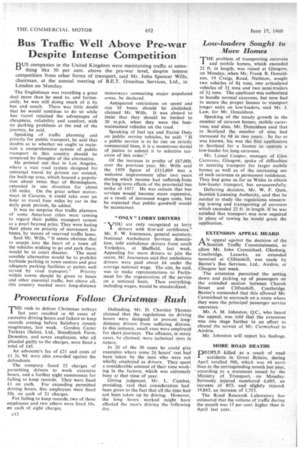Bus Traffic Well Above Pre-war Despite Intense Competition
Page 48

If you've noticed an error in this article please click here to report it so we can fix it.
rti US companies in the United Kingdom were maintaining traffic at some." thing like 50 per cent, above the pre-war level, despite intense competition from other forms of transport, said Mr. John Spencer Wills, chairman, at the annual meeting of B.E.T. Omnibus Services, Ltd., in London on Monday.
The Englishman was travelling a great deal more than he used to, and fortunately, he was still doing much of it by bus and coach. There was little doubt that he would continue to do so while bus travel retained the advantages of cheapness, reliability and comfort, with no parking problems at the end of the journey, he said. Speaking of traffic planning and priority for public transport, he said that doubts as to whether we ought to maintain a comprehensive system of public transport in this country should be tempered by thoughts of the alternative. He pointed out that in Los Angeles, where a vast road system designed for universal travel by private car existed, the built-up area, which housed a population about twice that of Birmingham, extended in one direction for about 130 miles. On the great urban motorways in Caracas, it could take over an hour to travel four miles by car in the daily peak periods, he added. It was no surprise that traffic planners of some American cities were coming to regard their public transport system as a pearl beyond price, They were basing their plans on priority of movement for buses, by means of reserved traffic lanes. Said Mr. Wilts, "It seems obvious that to accept into the heart of a town all the vehicles wishing to go and park there, would be to court disaster. The most sensible alternative would be to prohibit kerbside parking in town centres and give adequate parking facilities at points well served by road transport." Priority within towns should be given to buses and other essential traffic, but above all, this country needed more long-distance motorways connecting major populated areas, he declared. Antiquated restrictions on speed and
size "of buses should be abolished, claimed Mr. Wills. It was absurd to insist that they should be limited to 30 m.p.h. when they were the bestmaintained vehicles on the road.
Speaking of fuel tax and Excise Duty on public service vehicles, he said: "If
a public service is to be run on strictly commercial lines, it is a monstrous denial of justice to submit it to selective taxation of this order." Of the increase in profits of £67,000, over the previous year, Mr. Wills said
the 1959 figure of £513,809 was a welcome improvement after two years during which income had suffered, from the long-term effects of the provincial bus strike of 1957. He was certain that bus services would become more expensive, as a result of increased wages costs, but he expected that public goodwill would be maintained.
" ONLY " LORRY DRIVERS
" yOU are only recognized as lorry drivers with first-aid certificates," Mr. F. W. Journeaux, general secretary, National Ambulance Services Association, told ambulance drivers from south Yorkshire, at Sheffield, last week. Appealing for more drivers to join the union, Mr. Journeaux said that ambulance drivers were paid about £4 under the average national wage. The aim, he said, was to make representations to Parliament for the organization of the service on a national basis. Then everything, including wages, would be standardized.
























































































































